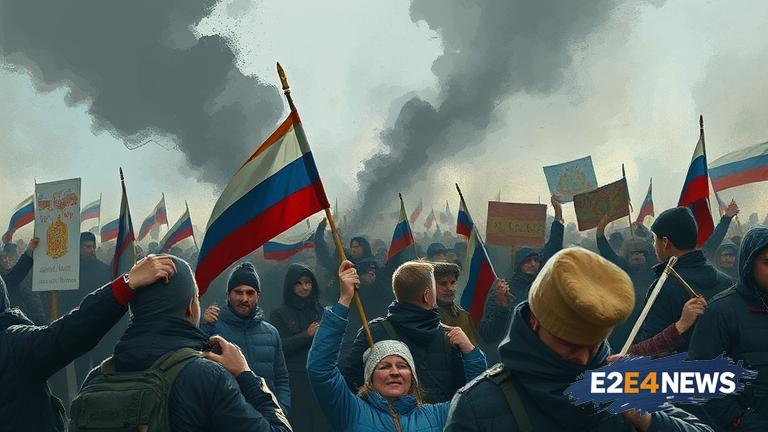The ongoing war in Ukraine has sparked a wave of protests across Russia’s internal borders, with citizens from various regions expressing their discontent with the conflict. The protests, which have been largely peaceful, have taken place in cities and towns across the country, including Moscow, St. Petersburg, and Yekaterinburg. The demonstrators, who come from diverse backgrounds and age groups, are united in their opposition to the war and their desire for peace. Many of the protesters have expressed their frustration with the Russian government’s handling of the conflict, citing the economic and humanitarian costs of the war. Others have spoken out against the militarization of Russian society and the suppression of dissenting voices. The protests have been met with a mixture of curiosity and hostility from the Russian authorities, who have arrested several dozen demonstrators and charged them with violating public order. Despite the risks, the protesters remain determined to make their voices heard, using social media and other platforms to organize and mobilize support. The protests have also sparked a wider debate about the role of Russia in the world and the impact of the war on the country’s relationships with its neighbors and the international community. As the conflict in Ukraine continues to escalate, the protests in Russia are likely to grow in size and intensity, posing a significant challenge to the authorities and their efforts to maintain control. The Russian government has responded to the protests by increasing its propaganda efforts, seeking to persuade citizens that the war is necessary and just. However, many Russians remain skeptical of the official narrative, and the protests are a testament to the growing discontent and disillusionment with the government’s policies. The international community has also taken notice of the protests, with many countries and organizations expressing their support for the demonstrators and their right to free speech and assembly. The protests in Russia are part of a larger trend of grassroots activism and dissent that is sweeping across the country, as citizens become increasingly frustrated with the government’s authoritarian tendencies and its failure to address pressing social and economic issues. The war in Ukraine has become a catalyst for this discontent, and the protests are a manifestation of the deep-seated anxieties and fears that many Russians have about the future of their country. As the protests continue to grow and evolve, they are likely to have significant implications for Russian politics and society, and may even pose a challenge to the authority of President Vladimir Putin. The Russian government will need to respond to the protests in a way that addresses the underlying concerns and grievances of the demonstrators, rather than simply seeking to suppress them. This will require a fundamental shift in the government’s approach to governance and its relationship with civil society, and may involve concessions and compromises that the authorities are currently unwilling to make. The protests in Russia are a reminder that even in authoritarian regimes, there are limits to the government’s power and control, and that citizens can and will mobilize to demand change and accountability. The international community has a critical role to play in supporting the protesters and promoting democratic values and human rights in Russia. By speaking out against the war and in support of the protesters, the international community can help to amplify the voices of Russian citizens and promote a more just and peaceful resolution to the conflict. The protests in Russia are a powerful reminder of the human cost of war and the importance of protecting human rights and dignity, even in the face of overwhelming oppression. As the world watches the situation in Russia unfold, it is clear that the protests will have far-reaching consequences for the country and the world, and will be a major factor in shaping the course of international relations in the years to come.





